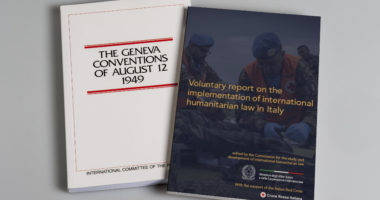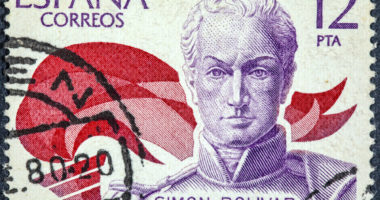For months now, researchers around the globe have been desperately working to develop a vaccine against COVID-19. As I write this, more than 170 candidate vaccines have been tracked by the World Health Organization (WHO). It is a race against the clock, and a waiting game we have all been forced to take part in.
When a vaccine does become available, we must learn from our mistakes from past health crises. We have seen greedy scrambles for access to therapies before, from HIV to H5NI influenza, bumping the most vulnerable countries – those in the grips of armed conflict – to the back of the queue. We have also seen how fear, misconceptions and mistrust, for example during the Ebola epidemic, can lead to stigmatization and violence against healthcare workers, exacerbating the burden on healthcare systems already overstretched from years of conflict and violence against healthcare providers.
While there is no blueprint to overcome these challenges, international humanitarian law (IHL) provides important guidance for parties to armed conflict that should not be overlooked in efforts to distribute and administer a future COVID-19 vaccine so as to ensure access to it by affected populations, without discrimination, and protect the healthcare professionals administering it.
Ensuring the provision of vaccines without discrimination: a legal obligation
Generally, under the right to health, States have the obligation to take necessary steps towards preventing, treating and controlling epidemics and to ensure the provision of healthcare for everyone under their jurisdiction, without discrimination, including through immunization against major communicable diseases.
In situations of armed conflict, international humanitarian law contains specific obligations related to the prevention of communicable diseases and epidemics towards certain groups of people and in certain situations. Rules governing detention require detaining powers to safeguard the health and hygiene of detainees as part of the basic necessities they must ensure to persons deprived of their liberty.[1] For example, Article 29 of the Third Geneva Convention provides that Detaining Powers must take all necessary sanitary measures to prevent epidemics in prisoner of war camps, which would include administering vaccinations where necessary to prevent or contain a further spread of communicable diseases.[2]
In situations of occupation, under Article 56 of the Fourth Geneva Convention, Occupying Powers have the obligation to ensure and maintain public health and hygiene in the occupied territory, with the cooperation of national and local authorities. They must take ‘preventive measures necessary to combat the spread of contagious diseases and epidemics’. Such measures comprise the distribution of medicines and vaccines, the establishment of stocks of medical supplies (including vaccines), or the dispatch of medical teams to administer vaccinations in areas where epidemics have broken out.[3]
These obligations, based on IHL and complemented by international human rights law, must be implemented without adverse distinction, i.e. distinction on any grounds other than health-related considerations. Health-related considerations may actually require prioritized or even differentiated treatment so as to ensure de facto equal treatment.[4] This means prioritizing vaccinations for people who may be particularly at risk, such as older people, people with co-morbidities, or health workers themselves. It also requires States to take specific positive measures for people who have particular difficulties accessing vaccination programmes, including children, older people, or people with disabilities.
Healthcare personnel and facilities: protected by IHL
During the COVID-19 pandemic many healthcare workers and people using their services have experienced stigma, sometimes leading to overt attacks, harassment and threats by civilians and weapon bearers alike.
Under international humanitarian law, healthcare personnel, facilities and transports involved in the transport, distribution or administering of vaccines enjoy specific protection when they are exclusively assigned by a competent authority of a party to a conflict to one or more medical purposes. Specific protection means that: 1) they must be respected and protected at all times (unless they commit, or are used to commit acts harmful to the enemy, outside their humanitarian functions); 2) they are entitled to use the emblem of the red cross, red crescent or red crystal; and 3) a loss of specific protection only becomes effective once a warning has not been complied with.
Vaccinations as protected medical activities
Apart from the search for, collection, transportation, diagnosis and treatment of wounded and sick people, IHL recognizes ‘prevention of disease’ as a medical purpose.[5] This includes administering vaccines, even where this benefits healthy members of the civilian populations, combatants or fighters in addition to those who have already fallen ill.
Civilian or military medical personnel exclusively assigned to vaccinating people – and to any of the other medical purposes –enjoy specific protection. The same is true for those exclusively assigned to the administration of medical facilities and the operation and administration of medical transports. For medical facilities, Article 8(e) of API contains a definition which also encompasses ‘preventive centres and institutes’, i.e. primary healthcare centres serving disease prevention, and in particular ‘vaccination centres’[6] engaged in prevention or containment of epidemics. Furthermore, ‘medical depots’ and ‘medical or pharmaceutical stores’ of medical units are also recognized as medical facilities, as places where medical supplies, including vaccines, are stored or from where medical facilities can obtain supplies. A number of experts have also argued that facilities engaged in the research, trial and production of vaccines may qualify as medical facilities.[7] Finally, aircraft, ships or vehicles exclusively assigned to the transportation of medical personnel, including those engaged in disease prevention, and/or medical supplies serving a preventive medical purpose like vaccines, are to be regarded as medical transports.
Respect and protect medical personnel and objects
To ‘respect’ means not to attack persons or objects involved in ensuring access to vaccines, and not to threaten, harass or otherwise unduly impede the performance of their functions. This prohibition does not preclude verification by parties to conflict that they are exclusively engaged in disease prevention activities like vaccinations by means of armed entries into medical facilities or at military checkpoints, as long as disruptions or delays of their medical activities are minimized.
To ‘protect’ entails taking all feasible measures to facilitate their functioning, such as actively helping to ensure the delivery of medical supplies, including vaccines, and to prevent medical personnel and objects from being harmed. It also entails taking feasible measures to ensure medical personnel are respected, including by third persons such as civilians who may be attacking or harassing medical personnel.[8]
Ethical healthcare activities are also protected
Regardless of whether they qualify for specific protection as medical personnel, no healthcare personnel may be compelled to act contrary to medical ethics or be threatened, harassed or punished for performing medical activities compatible with medical ethics, including those related to vaccinations.[9] Medical ethics include the equitable use of resources to the best available healthcare services; providing healthcare without discrimination and whenever possible, with the explicit consent of the person concerned; or respecting medical confidentiality, unless there is a real and imminent threat of harm to the person concerned or others. Healthcare professionals could not, for instance, be compelled to refrain from vaccinating certain members of affected populations based on the fact that they are associated with an adversary party to a conflict or punished for doing so.
It is also important that health personnel do not breach ethical duties, such as by revealing publicly the identity of people vaccinated or suspected of having contracted the virus, as this may expose those vaccinated or healthcare professionals involved in vaccinations to violence based on the stigma attached to COVID-19.
To provide a conducive environment in which healthcare professionals may work without attack, threats or interference with their ethical duties, and obtain a better understanding of their role and acceptance by populations, accurate information and dispelling misconceptions about vaccines and the role of medical personnel and objects is important. In the current pandemic, more proactive communication could go a long way to counter the stigmatization of medical personnel and facilities and the violence against them.
Ensuring that a vaccine reaches people in conflict-affected countries
International humanitarian law must be a guiding consideration for ensuring access by affected populations, without discrimination, to a future COVID-19 vaccine across the entire territories of countries affected by armed conflict. Where States affected by armed conflicts cannot ensure the basic needs, including medical needs, of the population under their control from COVID-19, they must grant consent to an offer of impartial humanitarian organizations to conduct humanitarian activities, including those related to vaccinations, as well as ease restrictions as far as possible.[10]
International humanitarian law also provides an elaborate framework of protection of healthcare professionals and facilities engaged in vaccination schemes. Belligerents must effectively address the stigma surrounding COVID-19 and those involved in containing the pandemic as a precondition for the performance, without undue hindrance, of the function of healthcare professionals involved in vaccinations.
With wealthy countries already striking deals for a COVID-19 vaccine that could leave supplies limited, we will need to use every tool in our toolbox to facilitate equal access. In situations of armed conflict, international humanitarian law is one of the tools to ensure that people in conflict-affected countries will also benefit from a vaccine.
See also
- Rachel Coghlan, Palliative care, COVID-19 and humanitarian action: it’s time to talk., July 2, 2020
- Call by global leaders: work together now to stop cyberattacks on the healthcare sector, May 26, 2020
- Cordula Droege, COVID-19 response in conflict zones hinges on respect for international humanitarian law, April 16, 2020
[1] Art. 29 GCIII; Art. 85 GCIV; Art. 5(1)(b) APII; Rule 121 customary IHL
[2] 2020 commentary on Art. 29 GCIII, para. 2197; 1960 commentary on Art. 29 GCIII, pp. 206-207].
[3] See also Art. 55 GCIV on more general obligations of Occupying Powers related to ensuring medical supplies.
[4] See for instance, Art. 12(4) GCI; Art. 16 GCIII; Art. 27(3) GCIV)
[5] Art. 24 GCI; Art. 8 (e) API, commentaries to rules 25, 28, 29 CIHL
[6] Commentary on Art. 8(e) API, para. 376]
[7] Second Statement on International Law Protections of the Healthcare Sector During Covid-19: Safeguarding Vaccine Research.
[8] See, for instance, Commentary on Art. 19 GCI, para. 1805].
[9] Art. 18(3) GCI ; Art. 16 API; Art. 10 APII, and associated commentary, para. 4687; Rule 26, Customary IHL Study.
[10] See also ICRC, IHL Rules on Humanitarian Access and COVID-19.






Comments